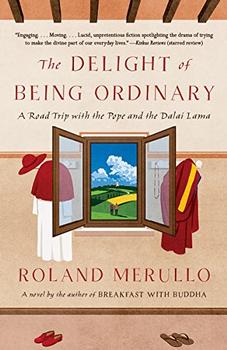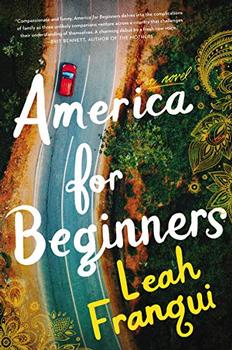Summary | Excerpt | Reading Guide | Reviews | Beyond the book | Read-Alikes | Genres & Themes | Author Bio

A Road Trip with the Pope and the Dalai Lama
by Roland Merullo"One day, the Pope and the Dalai Lama decide to go on a road trip together…" This sentence sounds like the start of a good joke, but is in fact, the premise of Roland Merullo's novel, The Delight of Being Ordinary.
Pope Francis, plagued by dreams and a general malaise resulting from never having time alone, decides he needs a break and charges his overburdened First Assistant and cousin, Paolo dePadova, with finding a way to arrange a short, unsupervised vacation. The visiting Dalai Lama is invited to join Francis in a jaunt through the Italian countryside for a few days of "being ordinary." The book's narrator, the panicky and unimaginative Paolo, enlists the help of his estranged wife, Rosa, a hairdresser to many Italian film stars. She borrows a lime green Maserati Quattroporte sedan and helps Paolo spirit the disguised holy men out of Rome.
There's a lot going on in this novel that makes it difficult to categorize. The first 50 pages or so are very funny as the horrified Paolo relates his initial disbelief – surely His Holiness doesn't really mean he's going to leave Rome without telling anyone – and later, his concerns about being labeled a kidnapper as he shepherds the two old men away from the Vatican. He recounts the glee which infuses the truants as they sneak away, while simultaneously fretting that he's making a huge mistake, going along with this whacky adventure. Merullo strikes the perfect tone here: Paolo is just the foil for the antics of those in his care, and his narrative voice is one of the most enjoyable aspects of the novel.
Once the road trip really gets going, the book becomes more serious and contemplative. Much of the narration describes the landscape as the quartet drives along, and the author conveys the natural beauty of the area vividly. But more of the text is devoted to heavier subjects. Throughout, Paolo ponders relationships and why they succeed or fail. He and his wife of twenty-one years have always loved each other, but their marriage withered, he thinks, because they simply didn't take the time to nurture it. For the escapade, Paolo disguises himself as a "boat person" – a refugee, perhaps from Syria or Tunisia. Several times he reflects on the experience of being someone other than a white male, and how his new dark skin has made him stand out and become a target for anger and distrust. This theme of Italian xenophobia is a timely discussion of attitudes toward immigrants across Europe and, by extension, elsewhere.
Rosa introduces topics for theological debate. At one point, for example, she asks the Pope what makes a good Catholic, claiming that she doesn't consider herself pious because she doesn't take time to pray. "There are many kinds of prayer," the Pope reminds her. "One kind would be simply to allow yourself some quiet time every day to contemplate the mystery of being alive." She brings up the question of celibacy and how she thinks it's unnatural to not desire physical intimacy. The Dalai Lama, a Buddhist who believes in reincarnation, replies: "Maybe if you have enough lifetimes with sex, there comes to you a lifetime where it doesn't matter so much as before. You feel the way that after big meal the person feels about eating. Maybe then you have the celibate life and you are content." These sections make up the heart of the book; the author clearly tries to present both the Christian and Buddhist view on various issues of morality and religion and to point out where the two philosophies overlap.
My opinion about The Delight of Being Ordinary is decidedly mixed. I loved the beginning; it has the madcap abandon of a good, old-fashioned Bob Hope and Bing Crosby road-trip movie from the 1940s. I also enjoyed the travelogue sections that so brilliantly describe the landscape of Italy that it made me yearn to visit. Paolo's contemplation of his relationship with his wife are realistic and heartfelt, and encouraged me to think about those who are important in my own life. However, the question-and-answer sections between the religious figures and the two secular individuals felt forced and awkward, and the author's attempts to reconcile the two belief systems was ultimately unsatisfying. Although a number of the discussions provided food for thought, they aren't woven into the action well and consequently come across as clumsy.
The Delight of Being Ordinary is still worth reading. Even if the theological discussions do take up a large part of the narrative, I found many gems scattered throughout that gave me pause, and parts of the book will stay with me for a long time to come. For those interested in exploring questions of faith, Merullo's take on the subject will likely prompt deeper personal contemplation, and this short, accessible novel will make an excellent selection for book groups.
![]() This review was originally published in The BookBrowse Review in April 2017, and has been updated for the
March 2018 edition.
Click here to go to this issue.
This review was originally published in The BookBrowse Review in April 2017, and has been updated for the
March 2018 edition.
Click here to go to this issue.

If you liked The Delight of Being Ordinary, try these:

by Leah Franqui
Published 2019
Recalling contemporary classics such as Americanah, Behold the Dreamers, and The Brief Wondrous Life of Oscar Wao, a funny, poignant, and insightful debut novel that explores the complexities of family, immigration, prejudice, and the American Dream through meaningful and unlikely friendships forged in unusual circumstances.

by Hiro Arikawa, Philip Gabriel
Published 2018
A life-affirming anthem to kindness and self-sacrifice, The Travelling Cat Chronicles shows how the smallest things can provide the greatest joy.
Your guide toexceptional books
BookBrowse seeks out and recommends the best in contemporary fiction and nonfiction—books that not only engage and entertain but also deepen our understanding of ourselves and the world around us.